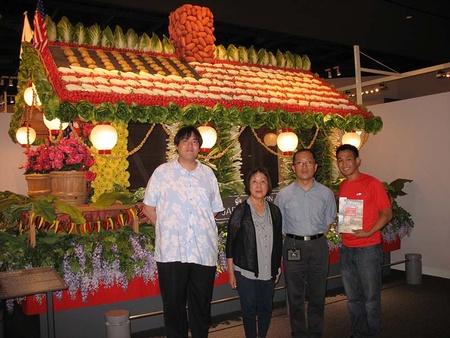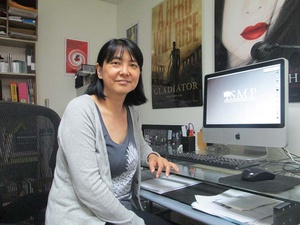Read Part 3 >>
Film editor: Chisako Yokoyama
Publicist: Takamichi Go
“You might think of short films as some kind of amateur work, but ‘Lil Tokyo Reporter’ was different. Their camerawork was extremely professional and its high quality made me want to get involved,” said Chisako Yokoyama, a film editor, as she recalled the time when Director Jeffrey Gee Chin showed her the unedited film.
With more than twenty years of experience in the industry, Chisako is the one and only Japanese film editor who started her Hollywood career in Bernardo Bertolucci’s “Little Buddha.” She has worked as the chief assistant on a number of films, such as “Good Will Hunting,” “Gladiator” and “Memoirs of a Geisha.” Another work that she worked on, “Black Hawk Down,” won the Academy Award for Best Film Editing.
Actively working in the front lines in the world of commercial films, did Chisako agree to work on this short film only because of its beautiful camerawork?
“I didn’t know about Sei Fujii. But I thought that it was a very meaningful project because the film is themed on the life of a historically significant person in the nikkei community. This was another big reason.”
However, as she had her own business running, a film production school in Torrance in the suburbs of Los Angeles in addition to her main work, film editing, she told Jeffrey that she could work on “Lil Tokyo Reporter” only on weekends. Working together with Jeffrey who accepted her conditions, she had to spend half a year on the film to make it into a 30-minute piece of work in the studio in her own school. Chisako said that she was impressed with Jeffrey’s passion as she worked on editing the film. “He’s not Japanese, but he did extensive research on Japanese cultures which made the film “authentically” Japanese. Without such studies on the streetscape of Little Tokyo and the lives of people, the film would not have achieved its high quality.”
While we won’t name them, we have seen “strangely portrayed” Japanese characters in quite a few number of Japanese-themed films made in America. “The unfortunate thing was that we had to remove some great acting scenes of Eijiro Ozaki who played the role of Sato. We had a few scenes in the film where there was an implication of Sei Fujii and Sato’s wife having an extramarital affair, and Sato expressed the conflict in their love relationship so well. But we thought that the emphasis on such aspect would hinder our intention of portraying Fujii as a pioneer of the nikkei community, so unwillingly we had to remove the scenes. Most directors don’t like to remove scenes so extensively when making short films, but Jeffrey didn’t have any objection. I think he really wanted to make a good film, rather than to satisfy his ego. He is a talented director.”
Inspired by Fujii who kept fighting in times of hardship
Chisako emphasized that the value of a film is determined by the number of its viewers. “No matter how great the film is, it can’t prove itself if it’s only got an audience of 10 people. We have to keep working to get as many viewers as possible to truly achieve the role of a film. In that aspect, even though it’s been three years since ‘Lil Tokyo Reporter’ was completed, they constantly update the facebook page and host screenings. They have received film awards, too. I think it’s great that they are continuously working to get the film out there.”
She also said that she learned a lot about Sei Fujii. “Even in times of such hardship, he never gave up and kept fighting for the rights of Japanese-Americans. I’m inspired by his power.”
Chisako herself, too, opened a school eight years ago, to teach the techniques of Hollywood film-making, despite the fact that she would have been just fine if she had continued her work as a film editor. “I’ve been asked for interviews by Japanese media since some time ago. And when they told me that there is no other Japanese film editor who’s succeeding in Hollywood, I felt like I had to foster people who would follow my path, to pass on the accomplishments of a Japanese film editor to the next generations.”
With the selected few focusing on hands-on training and learning experience, so far she has brought more than 50 graduates into the world. Sei Fujii who devoted himself to making a better life for his fellow Japanese-Americans and Chisako, who sacrifices her time to pass on her techniques to the future generation. Perhaps these two have something in common.
Currently the production team is working to get more screenings of “Lil Tokyo Reporter” in Japan. Takamichi Go who has worked on the film from its preparation stage is the one actively taking part in the media activities in Japan. He serves as Operating Officer at the Japanese American Living Legacy in Japan since he graduated from California State University. He translated Japanese documents into English and coordinated with Producer Carole and the direct descendants of Fujii as their contact person. He said that a lot of people in the audience became interested in the nikkei community when he hosted a screening back in Japan. In reality, the history of Japanese-Americans is barely known there. It will add another great value to host more screenings in Japan in the future, in addition to ones in America and Europe. “I will even more proactively take part in teaching the history of Japanese-Americans to Japanese people through this film,” said Go with strong determination.
Lil Tokyo Reporter – a movie that is themed on the first-generation Japanese immigrants, created with support and all the hard work of people with a variety of backgrounds – Japanese-American, Chinese-American and Japanese. As Chisako said, the value of a film is determined by the number of people who watch it. We hope that more and more people will get interested in the film and watch it in the future.

* DVDs available for purchase on the official site of Lil Tokyo Reporter
Message from Executive Producer:
"Lil Tokyo Reporter” continues to be screened nation-wide and internationally. Please consider making a tax-deductible donation payable to the Little Tokyo Historical Society to support ongoing promotions. Your much appreciated support will help us share the forgotten civil rights journey of Issei Pioneer Sei Fujii.
Mail to: Lil Tokyo Reporter Film, PO Box 3552, Rolling Hills Estates, CA 90274
F. Carole Fujita
Executive Producer
Lil Tokyo Reporter
© 2014 Keiko Fukuda






